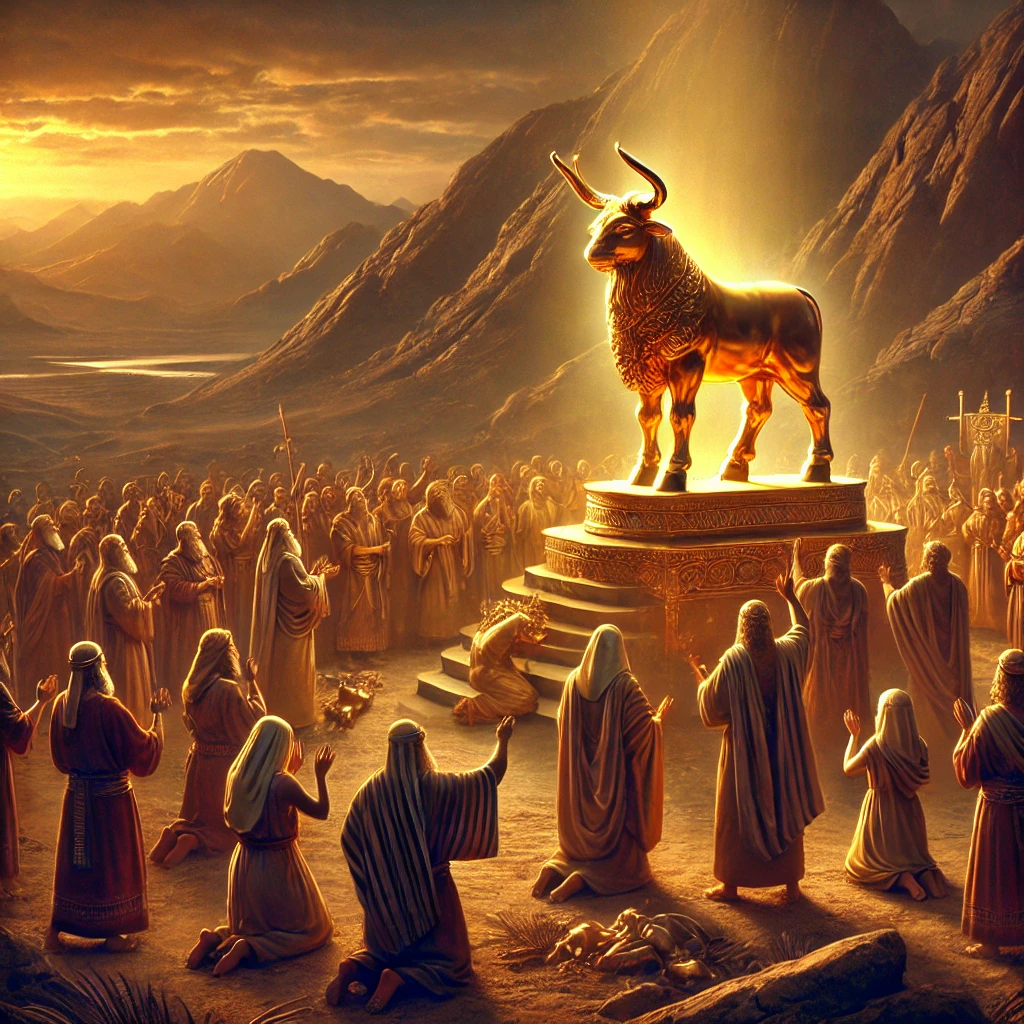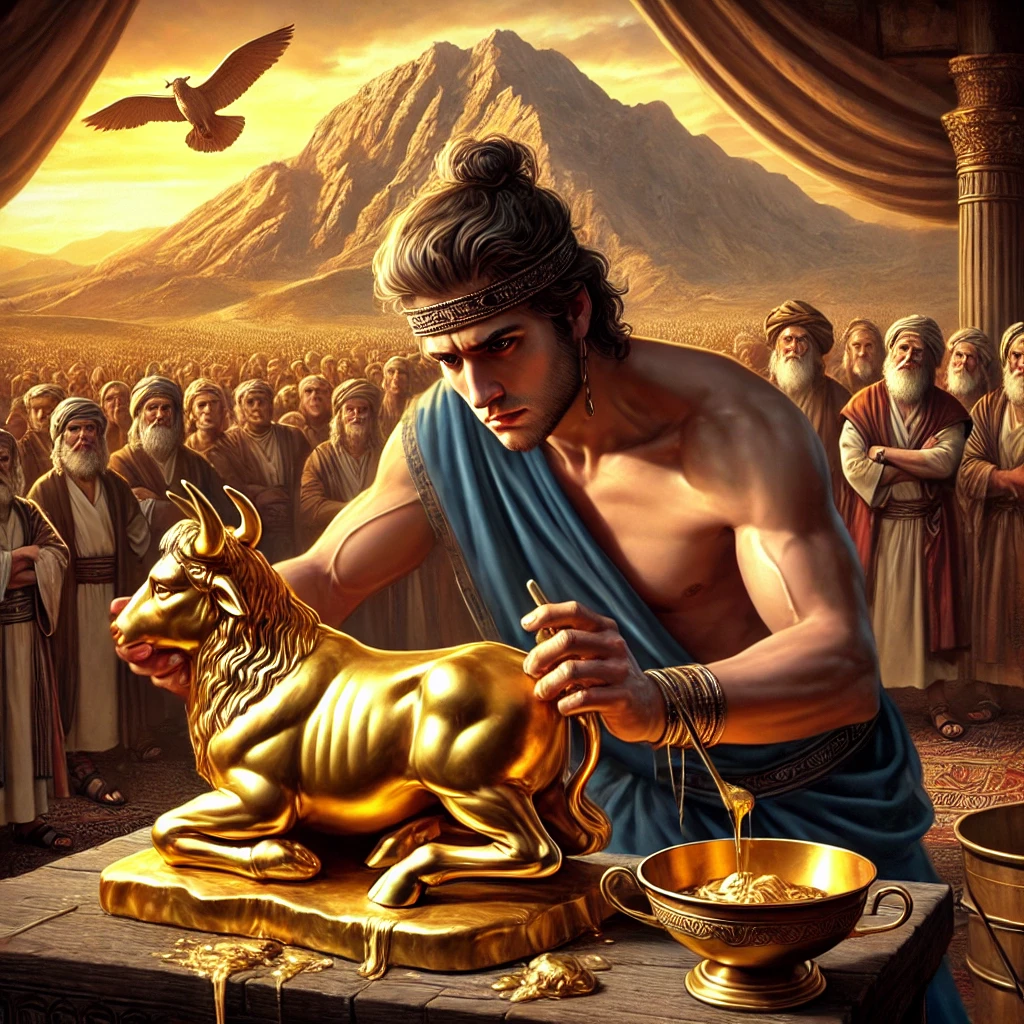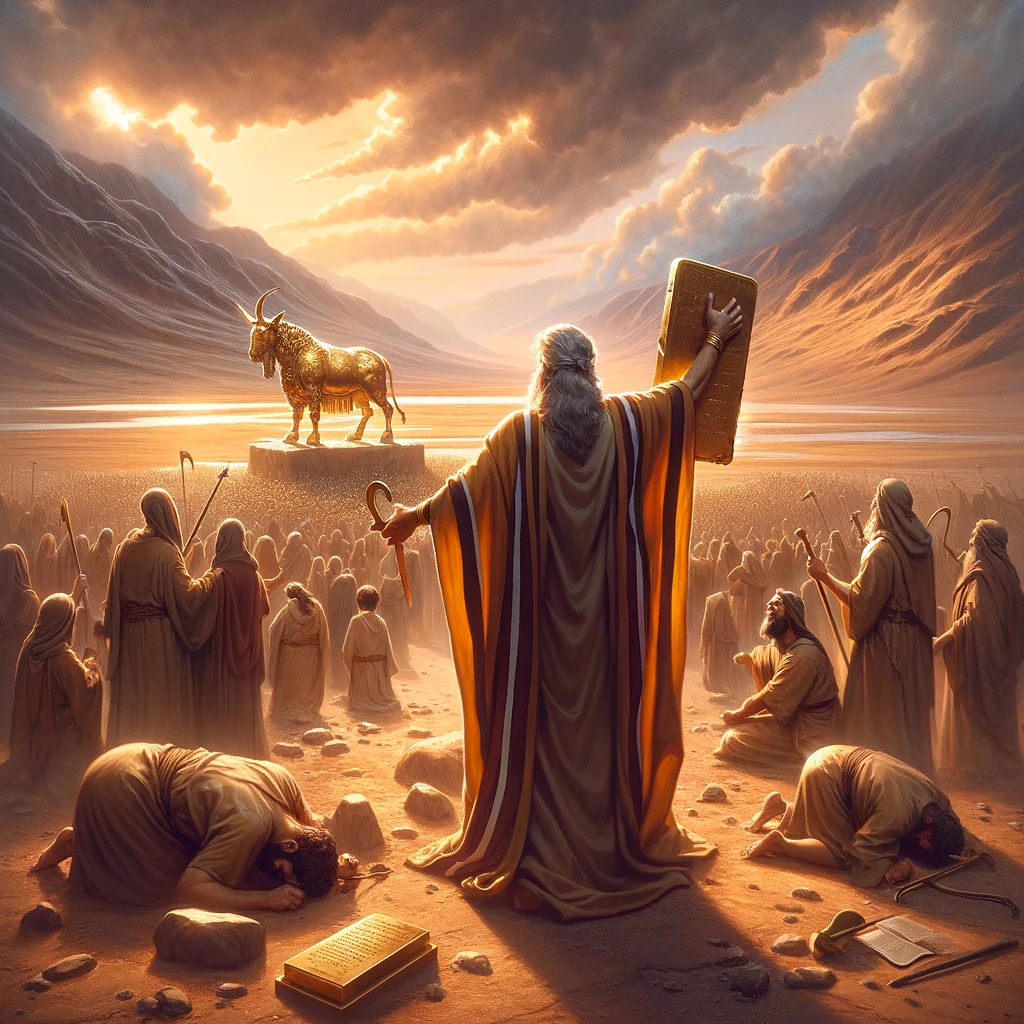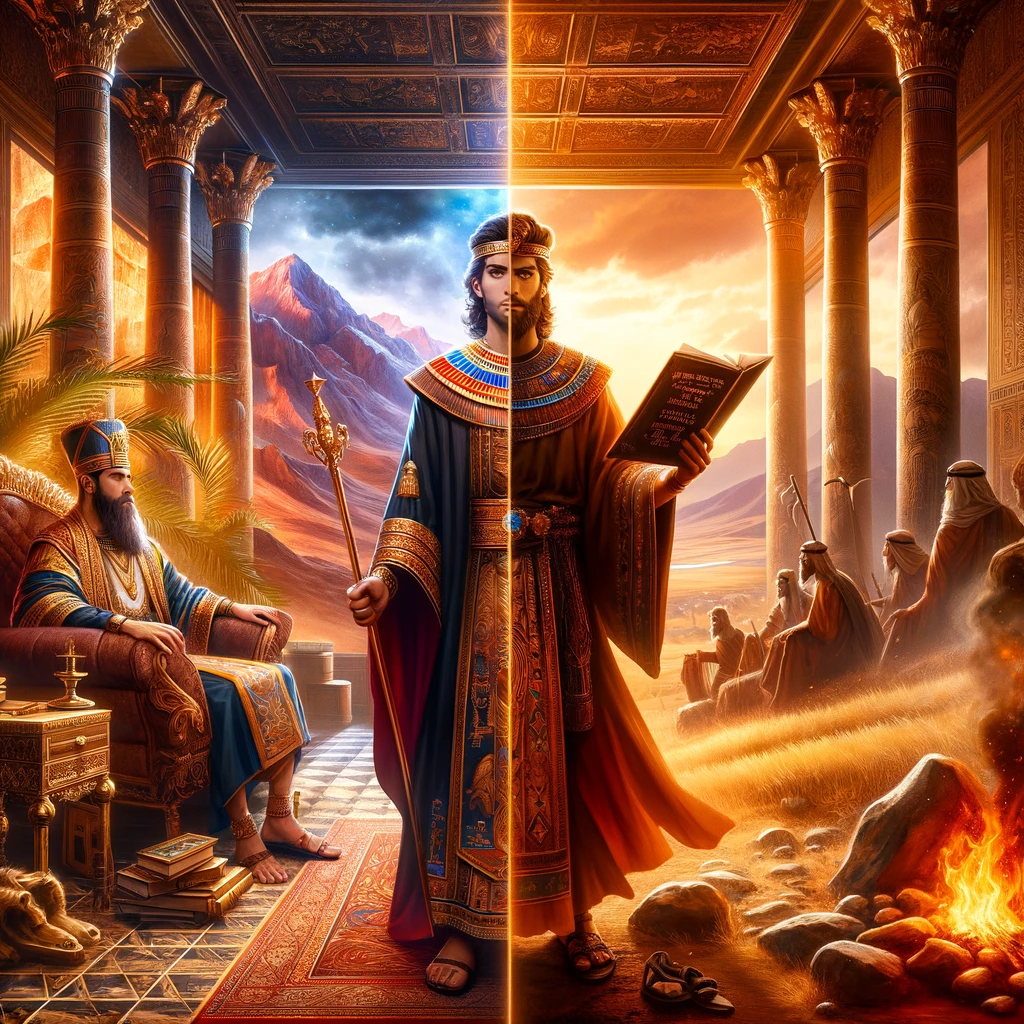Did you know that 68% of Americans admit to having some form of “idol” in their lives? From social media likes to material possessions, modern-day idolatry is alive and well. But what can an ancient story about a golden statue teach us about our 21st-century struggles? Buckle up, because we’re about to dive deep into the Biblical account of the Golden Calf – and trust me, the lessons we’ll uncover are more relevant now than ever before!
The Historical Context: Setting the Stage for the Golden Calf Incident
To fully grasp the lessons from the Golden Calf incident, we need to step back in time and understand the context in which it occurred. The Israelites had just experienced an incredible deliverance from slavery in Egypt, where they had been oppressed for over 400 years. God, through Moses, led them out of Egypt with a mighty hand, performing miracles like the parting of the Red Sea and providing manna from heaven.
However, as they journeyed through the wilderness, Moses ascended Mount Sinai to receive the Ten Commandments from God. During this time, the Israelites grew impatient. Their leader was away, and they began to doubt whether Moses would return. In their fear and uncertainty, they turned to Aaron, Moses’ brother, asking him to create a physical representation of God to lead them. This led to the creation of the infamous Golden Calf, a symbol of their wavering faith and spiritual impatience.
Lesson 1: The Danger of Spiritual Impatience
The story of the Golden Calf is a powerful reminder of the dangers of spiritual impatience. The Israelites had just witnessed incredible miracles, yet their desire for immediate gratification led them to abandon their trust in God. They couldn’t wait for Moses to return and sought a quick fix to their spiritual uncertainty.
In our own lives, how often do we find ourselves impatient with God’s timing? We live in a culture of instant gratification, where everything is available at the click of a button. But spiritual growth doesn’t work that way. Waiting on God requires patience, and it’s during these times of waiting that our character and faith are built. Just as the Israelites needed to trust that Moses would return, we need to trust that God’s timing is perfect, even when it doesn’t align with our own.
Modern parallels to this lesson are everywhere. Whether it’s rushing into decisions without seeking God’s guidance or abandoning our faith in difficult times, the lesson is clear: impatience can lead us down a dangerous path. By learning to wait on God, we develop the resilience and trust needed to navigate life’s challenges.
Lesson 2: The Subtle Shift from Worship to Idolatry

One of the most striking aspects of the Golden Calf story is how quickly the Israelites’ worship shifted from God to an idol. Initially, their intention might have been to create a symbol to remind them of God’s presence. But that symbol quickly became the object of their worship.
This subtle shift is a powerful warning for us today. It’s easy to start with good intentions—using symbols or rituals to enhance our spiritual lives. However, there’s a fine line between using these tools to draw closer to God and allowing them to replace God in our hearts. Whether it’s a religious object, a tradition, or even a church building, anything can become a “golden calf” if we’re not careful.
In contemporary religious practices, we must be vigilant. Are there things in our spiritual lives that have taken God’s place? It’s crucial to regularly examine our hearts and ensure that our worship is directed solely towards God, not the symbols or traditions that represent Him. By staying focused on the true object of our worship, we avoid the pitfalls of idolatry that ensnared the Israelites.
As we reflect on these lessons, let’s remember that the story of the Golden Calf isn’t just about an ancient people; it’s about us. It’s about the challenges we face in staying true to our faith in a world full of distractions. And most importantly, it’s about the power of returning to God, even when we’ve strayed.
Lesson 3: Leadership Under Pressure – Aaron’s Crucial Mistake

Leadership, especially spiritual leadership, comes with immense responsibility. Aaron, left in charge of the Israelites while Moses was on Mount Sinai, faced a critical moment when the people demanded an idol. Instead of standing firm in his faith and convictions, Aaron gave in to their demands and created the Golden Calf.
Aaron’s response is a sobering reminder of the challenges that come with leadership. It’s tempting to give people what they want, especially when under pressure. But true leadership requires the courage to stand firm, even when it’s unpopular or difficult. Aaron’s failure to do so led the entire community into sin.
For modern religious and secular leaders, the lesson is clear: leadership is not about pleasing people but about guiding them in the right direction, even when it’s hard. It’s about making decisions that honor God and uphold integrity, even in the face of opposition. In today’s world, leaders are often pressured to conform to popular opinion, but the story of Aaron teaches us that compromising on our convictions can have devastating consequences.
Lesson 4: The Consequences of Collective Sin
When the Israelites turned to idol worship, it wasn’t just an individual failing—it was a collective sin that brought consequences on the entire community. God’s response was swift and severe, but it also included Moses’ intercession on behalf of the people.
This teaches us about the ripple effects of communal wrongdoing. When a group, community, or nation engages in sin, the consequences are far-reaching. It affects everyone, not just those directly involved. Moses’ intercession highlights the importance of taking responsibility, even for the sins of others, and seeking God’s mercy on behalf of the community.
In today’s society, this lesson is incredibly relevant. We see collective sin in many forms, from systemic injustice to environmental neglect. As Christians, we are called to recognize these issues, take responsibility, and work towards repentance and restoration. It’s not enough to turn a blind eye to communal wrongdoing; we must actively seek to correct it, just as Moses did for the Israelites.
Lesson 5: Repentance and Restoration – The Path Forward

After the sin of the Golden Calf, Moses took decisive action to address the wrongdoing and restore the people’s relationship with God. He destroyed the idol, confronted the people, and pleaded with God for their forgiveness. This process of repentance and restoration was not easy, but it was necessary for the Israelites to move forward.
Repentance is more than just feeling sorry for our sins—it’s about turning away from them and taking concrete steps to restore our relationship with God. Moses’ actions show us that genuine repentance involves both acknowledging our wrongs and making amends. It’s a transformative process that leads to spiritual growth and renewal.
For individuals and communities today, overcoming modern idolatry begins with repentance. We must identify the “golden calves” in our lives—whether they are material possessions, status, or anything else that takes God’s place—and take steps to remove them. This might involve making difficult changes, but the reward is a restored and deepened relationship with God.
As we seek repentance, it’s important to remember that God’s mercy is always available to us. Just as He forgave the Israelites, He is willing to forgive us when we come to Him with a sincere heart. Repentance leads to restoration, and through this process, we can experience the transformative power of God’s love and grace in our lives.
Lesson 6: Idols of the Heart – Beyond Golden Statues
When we think of idolatry, it’s easy to picture the Israelites bowing before a golden statue. But idolatry goes far beyond physical idols. In today’s world, the idols we struggle with are often intangible, yet they have just as much power to draw us away from God. These “heart idols” can be anything that takes God’s rightful place in our lives—whether it’s our career, relationships, social status, or even personal ambitions.
Identifying these heart idols can be challenging because they often start as good things that we allow to become ultimate things. The key is to regularly examine our hearts and ask ourselves what we are truly worshipping. Are we seeking our identity in Christ, or are we finding it in something else? Are we placing our trust in God, or in our own abilities and achievements?
Addressing these heart idols requires intentionality. It’s not enough to simply recognize them; we must take practical steps to dethrone them from our lives. This might involve setting boundaries around how we spend our time, practicing gratitude to shift our focus back to God, or seeking accountability from others in our faith community. By maintaining a God-centered focus, we can ensure that our hearts remain aligned with His will, free from the distractions and false promises of modern-day idols.
Lesson 7: The Role of Memory in Preventing Idolatry
One of the most powerful tools we have to prevent idolatry is our memory. Throughout the Bible, God repeatedly calls His people to remember His faithfulness and the miracles He has performed. This act of remembering serves as a safeguard against turning away from Him, as it reminds us of His power, love, and provision.
For the Israelites, forgetting God’s past works led them to seek security in a golden calf. In our own lives, spiritual amnesia can lead us to seek fulfillment in things other than God. This is why it’s crucial to establish personal and communal practices that reinforce our spiritual memory. Whether it’s through regular prayer, studying Scripture, or participating in communal worship, these practices help us keep God’s deeds fresh in our minds.
In today’s digital age, we can also use technology and creativity to combat spiritual amnesia. This might involve setting reminders on our phones to pray or reflect on God’s goodness, creating visual art that depicts God’s miracles in our lives, or sharing testimonies online that encourage others to remember God’s faithfulness. By keeping our memory of God’s work alive, we protect ourselves from the lure of idolatry and remain anchored in our faith.
Lesson 8: Balancing Divine Justice and Mercy

The story of the Golden Calf also teaches us about the delicate balance between God’s justice and His mercy. When the Israelites turned to idolatry, God’s response was one of righteous anger, leading to judgment. Yet, in the midst of this judgment, there was also an opportunity for forgiveness and redemption through Moses’ intercession.
This balance between justice and mercy is something we must grapple with in our own lives. On one hand, there are consequences for our actions, and ignoring them can lead to further harm. On the other hand, God’s mercy offers us a path to redemption and restoration, even after we’ve strayed.
In our personal relationships and societal issues, we are often faced with situations where we must balance holding others accountable with extending grace. Whether it’s dealing with someone who has wronged us or addressing broader social injustices, we are called to reflect both God’s justice and His mercy. This means not turning a blind eye to wrongdoing, but also being quick to forgive and seek reconciliation.
By applying this balance in our interactions, we model the character of God and create a culture where both justice and mercy can thrive. This is not always easy, but it’s a crucial part of living out our faith in a world that often leans too heavily on one side or the other. As we navigate these challenges, let’s remember that God’s ultimate goal is always restoration and that our actions should reflect His desire to bring healing and wholeness to our relationships and communities.
Lesson 9: The Power of Intercessory Prayer
One of the most profound moments in the Golden Calf story is Moses’ role as an intercessor for the people. When God’s anger burned against the Israelites for their idolatry, it was Moses who stood in the gap, pleading with God to spare them. His prayers were not just a desperate plea but a powerful act of love and leadership. Through his intercession, Moses demonstrated the incredible impact that standing in prayer for others can have.
Intercessory prayer is a vital practice for all believers. It’s not just about praying for our own needs but lifting up the needs of others, whether they are individuals, communities, or even nations. By interceding, we participate in God’s work of redemption and healing, aligning ourselves with His heart for His people.
Developing a habit of intercessory prayer in our daily lives can transform not only the lives of those we pray for but also our own hearts. It helps us to cultivate compassion, humility, and a deeper connection to God’s will. Whether it’s setting aside specific times to pray for others or simply lifting up prayers as the Holy Spirit prompts, intercession is a powerful way to make a tangible difference in the world around us.
Lesson 10: Rebuilding Trust After Idolatry
After the sin of the Golden Calf, God did not abandon His people. Instead, He renewed His covenant with Israel, demonstrating His unfailing love and commitment to them despite their failure. However, this renewal required the people to take steps toward rebuilding their relationship with God, starting with repentance and a recommitment to His commands.
Rebuilding trust after idolatry—or any form of misplaced priorities—takes time and intentionality. Whether it’s in our relationship with God or with others, trust is not automatically restored; it must be earned through consistent, faithful actions. This involves acknowledging where we’ve gone wrong, seeking forgiveness, and making changes to ensure that our priorities are rightly aligned moving forward.
In our faith communities, creating a culture of accountability and support is crucial for rebuilding trust. This means being honest about our struggles, encouraging one another in our faith journeys, and holding each other accountable to the commitments we’ve made. It’s about walking alongside one another in love, helping each other stay focused on God’s will for our lives.
By fostering this kind of environment, we not only help individuals restore their relationship with God but also strengthen the entire community’s spiritual health. As we move forward, let’s commit to being a part of this process, supporting one another as we seek to live out our faith with integrity and devotion.
Wow, what a journey we’ve been on! From the dusty foothills of Mount Sinai to the bustling digital landscape of 2024, the lessons from the Golden Calf story continue to shine brightly. We’ve seen how easily our hearts can be led astray, but also how powerful genuine repentance and God’s mercy can be. As we close, I challenge you: take a moment to reflect on your own life. What “golden calves” might be lurking in the corners of your heart? Remember, identifying them is the first step to breaking free. Let’s commit to keeping our focus on what truly matters, supporting each other in the process, and embracing the transformative power of faith. After all, in a world full of glittering distractions, the most revolutionary act might just be staying true to our deepest values.
FAQ : Understanding the Golden Calf and Overcoming Idolatry
Q1: What is the significance of the Golden Calf story in the Bible?
A: The Golden Calf story, found in Exodus 32, is significant because it highlights the dangers of idolatry and the consequences of turning away from God. It teaches us about the importance of staying faithful to God, the consequences of sin, and the power of repentance and restoration.
Q2: How does the concept of idolatry apply to modern life?
A: In modern life, idolatry can take many forms beyond physical statues. It includes anything that takes God’s place in our hearts, such as material possessions, social status, relationships, or even personal ambitions. These “heart idols” can distract us from our relationship with God and lead us away from His will.
Q3: What lessons can we learn from Aaron’s response to the people’s demands?
A: Aaron’s response teaches us the importance of strong leadership and standing firm in our convictions, even when under pressure. His failure to do so led to the creation of the Golden Calf and the collective sin of the Israelites. This lesson is crucial for both religious and secular leaders today.
Q4: How can I identify “heart idols” in my own life?
A: To identify “heart idols,” reflect on what consumes your thoughts, time, and resources. Ask yourself if there are things in your life that you prioritize over your relationship with God. Prayer and self-examination, along with accountability from trusted friends or mentors, can help you identify and address these idols.
Q5: What practical steps can I take to overcome idolatry in my life?
A: Overcoming idolatry involves repentance, reordering your priorities, and seeking a deeper relationship with God. Practical steps include setting boundaries around what distracts you from God, practicing gratitude to shift your focus back to Him, and engaging in regular prayer and worship to maintain a God-centered life.
Q6: How can I develop a habit of intercessory prayer?
A: Developing a habit of intercessory prayer involves setting aside regular time to pray for others, being mindful of the needs around you, and asking the Holy Spirit to guide your prayers. You can also keep a prayer journal to track who you’re praying for and how God is working in their lives.
Q7: What does the story of the Golden Calf teach us about God’s mercy and justice?
A: The story of the Golden Calf illustrates the balance between God’s justice and mercy. While God responded to the Israelites’ sin with righteous anger, He also provided an opportunity for repentance and restoration through Moses’ intercession. This teaches us that while sin has consequences, God is always willing to forgive and restore those who turn back to Him.
Q8: How can communities rebuild trust after falling into collective sin?
A: Rebuilding trust involves acknowledging the wrongdoing, seeking forgiveness, and making intentional changes to prevent future mistakes. In faith communities, this process is supported by creating a culture of accountability, mutual support, and a renewed commitment to God’s principles.
This FAQ section addresses common questions that readers may have about the lessons from the Golden Calf story and how to apply them in their lives today.
Seeking Guidance and Support
As we reflect on the lessons from the Golden Calf story and their relevance to our lives today, it’s essential to recognize that overcoming idolatry and rebuilding our relationship with God is not a journey we have to take alone. Seeking guidance from trusted spiritual leaders and support from a faith community can provide invaluable encouragement and accountability.
If you’re struggling with identifying and overcoming the “golden calves” in your life or need help developing a stronger, God-centered focus, consider seeking professional Christian counseling or spiritual direction. These resources can offer personalized support and guidance tailored to your unique spiritual journey.
For more information and resources on Christian counseling, visit American Association of Christian Counselors.



